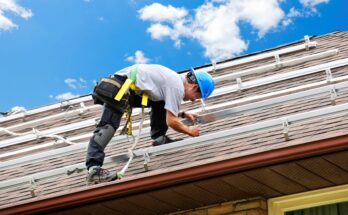We carry out both repair and restoration work on existing roofs and the installation of roofs on objects under construction. We carry out work in a comprehensive manner, from design and supply of materials to installation and commissioning of the state commission. Our specialists can carry out work on roofs of various types: Built-up, Metal/seam, Metal tiles, Composite tiles, Flexible/bituminous tiles, Non-ferrous metal roofing.
truss system
Rafters are the central load-bearing part of the roof structure, which takes on all the load-bearing functions. The truss system is designed to withstand the weight of the roof and the pressure of snow and wind.
Read Also: Mold remediation brentwood
The specialists of our company can carry out both the installation of a newly built truss system and the roof repair and restoration of rafters on existing structures.
Let’s take a closer look at the types of roofing:
Built-up roof
It is used mainly on flat surfaces or for roofs with a slight inclination angle. This technology has proven itself in urban housing and industrial construction due to the high degree of protection against external moisture.
Main advantages:
- Excellent frost resistance
- Durability and reliability (no rot and mold resistance)
- Good waterproofing properties
- Low cost of material and installation
Metal/seam roofing
Metal seam roofing is a covering where the joints of roofing sheets are realized with the help of seams. Folds are a kind of seam with which metal roofing sheets are fastened.
Main advantages:
- Durability and high reliability
- It does not conduct electricity
- Resistant to sudden temperature changes
- Durability and reliability (no rot and mold resistance)
- A large selection of tile-cutting shapes and color schemes make it possible to make almost every home unique and beautiful.
metal tile
Metal tiles are widely used among roofing materials in low-rise buildings. Metal tiles are galvanized sheets of high-quality steel with a special polymer coating, which performs a protective and decorative function.
Main advantages:
- Durability and high reliability
- A lightweight
- small cost
- Fast installation
- Durability and reliability (no rot and mold resistance)
- Huge selection of shapes, colors, and shades
Composite roof tiles
Composite tiles are classified as “elite” roofing materials. The appearance of a composite roof is an imitation of natural tiles. This material is based on a profiled steel sheet with a special protective coating. But at the same time, steel is protected by a special alloy – “ALUZINC.” It is an alloy of zinc, aluminum, and silicon – very durable and more modern. This alloy creates more reliable protection against corrosion and high temperatures. Outside, the sheet is covered with an acrylic (or polymer) primer, on which, in turn, mineral granules are already applied.
Main advantages:
- Durability and reliability
- Noiselessness
- Lightweight
- Scratch, UV, and corrosion resistant
- Compact sheet sizes
- Huge selection of shapes, colors, and shades
Flexible / shingles
Flexible/bituminous tiles are roofing materials based on fiberglass, which, in turn, is impregnated with modified bitumen. Due to their reliability, variety of shapes and shades, easy installation, and suitability for use on any pitched roof, shingles have become one of the most popular roofing materials in low-rise residential construction.
Main advantages:
- Excellent sound isolation
- It does not conduct electricity
- Resistant to sudden temperature changes
- Durability and reliability (no rot and mold resistance)
- A large selection of tile-cutting shapes and color schemes make it possible to make almost every home unique and beautiful.
Non-ferrous metal roofing
Copper, aluminum, and zinc-titanium alloy are non-ferrous metals used for roofing from metal sheets.
Roofing made of copper is not subject to corrosion does not require any maintenance, hence the cost of operation. A beautiful appearance gives the roof elegance and nobility. But the high price is a significant disadvantage of copper.
Aluminum has a low weight, making it possible to use it on almost all crates. Aluminum roofing is durable, resistant to natural phenomena and precipitation, and does not change color during operation.
Zinc-titanium alloy has advantages compared to copper. This material is not subject to rust and has a long service life and environmental friendliness. And its cost is almost two times lower than the cost of copper.
Gutter systems
Modern drainage systems are made of metal with a polymer coating or plastic.
Metal gutters are used everywhere. Modern polymer coatings are very reliably protected from corrosion and can be painted in various colors.
The main advantages of metal drainage systems:
- High reliability and mechanical strength
- Long services life even in the most adverse weather conditions
- A slight change in linear dimensions with sudden temperature changes
Plastic gutters are mainly used in low-rise residential construction. They can be of the most complex configurations and have an attractive appearance.
The main advantages of plastic drainage systems:
- Not subject to corrosion
- Plastic perfectly absorbs water noise
- Lower price compared to steel gutters
- Lightweight and easy installation.



